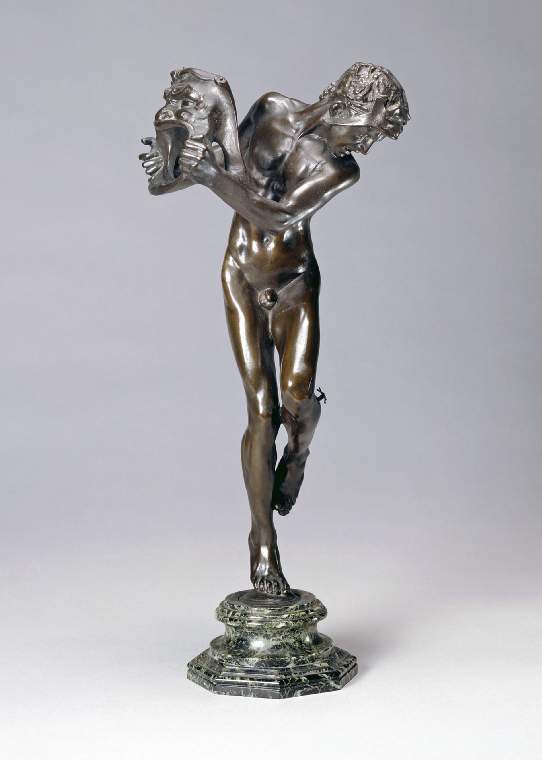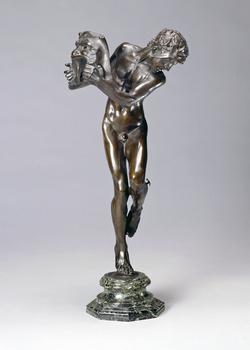Current Location: In storage
Titles
Comedy and Tragedy: Sic Vita
Translated as: Comedy and Tragedy: Such is Life
Maker(s)
Sculptor:
Gilbert, Alfred
Entities
Categories
Description
Bronze, cast, supported on green figured marble base. A nude youth, wearing a visor-like mask pushed back above his face, and holding in both hands a large gaping mask of Comedy, stands on the ball of his left foot and looks down towards his bent and raised left leg. A bee has just stung the calf and he grimaces in pain to form the mask of Tragedy. The octagonal base rises up in the middle into a circular socle with a depression in the top in which the circular base of the bronze stands.
Notes
History note: Purchased from The Fine Art Society Ltd., Bond Street, London W 1, for £60 by Derek Parsons in 1943; sold by him to G.C.Arnallt Jones on 21 December 1944; his brother-in-law Ivor Glyndwr Davies,Cardiff; his niece, Mrs Margaret Rowena Davey, née Davies (1917-2002); accepted by H.M. Treasury in lieu of capital taxes and allocated to The Fitzwilliam Museum from the estate of Mrs Davey.
Legal notes
Accepted by H.M. Treasury in lieu of capital taxes and allocated to The Fitzwilliam Museum
Measurements and weight
Height: 37 cm
Acquisition and important dates
Method of acquisition: Allocated
(2003-10-20)
by
H.M. Treasury
Dating
19th Century, Late
Victoria
Circa
1891
CE
-
Circa
1892
CE
Note
Comedy and Tragedy was the name of a play by W.S.
Gilbert which the sculptor had seen several times. He added the comment ‘Sic Vita’ (such is life) . The bee symbolizes love, and its sting, the pain love causes.The bronze originated in a sketch made in 1890, and in 1891, Gilbert developed his idea, using an Italian, Angelo Colorossi, as a model for the youth. The polychromed plaster sculpture was exhibited at the Royal Academy in 1892. Bronzes were cast in two sizes, 29 in (73.7 cm) and 14 in (36.8 cm).
Between 1902 and 1905 Gilbert or his son ordered casts of several of his most popular works through the Compagnie des Bronzes in Brussels, but this bronze does not bear the foundry’s mark.
Sir Alfred Gilbert RA MVO (1854-1934) was an English sculptor. He studied in London, Paris and Rome, returning to England in 1884. Gilbert was the leading artist in the New Sculpture movement, which revitalised sculpture in late nineteenth-century Britain. He was also a vital force in reintroducing the lost-wax technique for casting works of art in bronze in England (sand-casting had been the norm for bronze sculpture since the 18th century, with lost-wax casting used only for small-scale work and jewellery). His commissions included the jubilee memorial to Queen Victoria in Winchester and the statue of Eros, in aluminium, for the Shaftesbury Memorial Fountain in Piccadilly Circus, and in 1900 he was appointed Professor of Sculpture at the Royal Academy. A period of bankruptcy and divorce followed, and Gilbert moved to Bruges. On his return to England in 1926, his fortunes improved, the highlight being the bronze Queen Alexandra Memorial, at Marlborough House, London, 1926-32. He was knighted by George V in 1932. Gilbert died in poverty in 1934.
Cast by the indirect lost wax process
School or Style
New Sculpture Movement
People, subjects and objects depicted
Project
Components of the work
Figure
composed of
patina
( applied)
bronze
( presumed)
Base
composed of
marble
( dark green figured)
Width 9.9 cm
Bee
References and bibliographic entries
Identification numbers
Accession number: M.1-2003
Primary reference Number: 95764
External ID: CAM_CCF_M_1_2003
Stable URI
Audit data
Created: Saturday 6 August 2011
Updated: Tuesday 26 March 2024
Last processed: Tuesday 13 May 2025
Associated departments & institutions
Owner or interested party:
The Fitzwilliam Museum
Associated department:
Applied Arts





